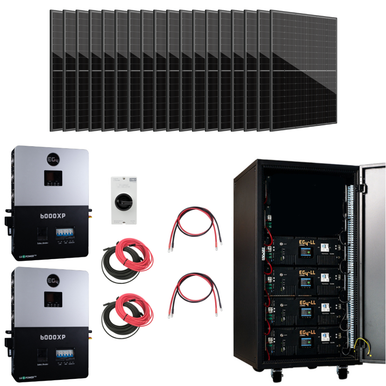dm9289
Industrial Maintenance Electrician
- Location
- Pennsylvania
- Occupation
- Industrial process repair/ maintenance Electrician
Short version I am reasonably familiar with residential utility interactive systems. A close friend from the local PA electrical union with roughly 30 years experience wanted to self install a ground mount PV system for his home to go off grid, which sparked tons of discussion.
He has a gas heated house about 1500 SQft with a 200amp 120/240 single phase system and a large detached 3 car garage about 100ft away. He wanted to house inverters and batteries in that garage. (cold location not normally heated)
His main purpose for solar was car charging he has a chevy bolt 240volt 32.5 amp charger plus a Ford cmax 240volt 16 amp charger.
He wanted to but this internet system

 signaturesolar.com
signaturesolar.com
He wanted to at minimum supply the garage completely off solar and batteries but have an ability to switch the main house to solar via manual transfer switch also. He will likely have to recharge car daily due to nature of his job. WE live in an area of PA with very little sunlight and to me it seemed on gray days these units do run but at about 15%.
To experience folks does this scenario seem likely to work
He has a gas heated house about 1500 SQft with a 200amp 120/240 single phase system and a large detached 3 car garage about 100ft away. He wanted to house inverters and batteries in that garage. (cold location not normally heated)
His main purpose for solar was car charging he has a chevy bolt 240volt 32.5 amp charger plus a Ford cmax 240volt 16 amp charger.
He wanted to but this internet system
Complete Off-Grid Solar Kit - 13,000W 120/240V Output / 48VDC [20.5kWh EG4-LifePower4 Lithium Powerwall] 48VDC + 11,040 Watts of Solar PV | [KIT-E0000]

Complete Off-Grid Solar Kit EG4 6000XP x2 | 20.48kWh Capacity + 12800 Watts of Solar PV [KIT-E0009]
Explore energy independence with Off-Grid Solar Kits, EG4 6000XP inverters. Choose components, batteries, and panels. Revolutionize your energy with EG4.
He wanted to at minimum supply the garage completely off solar and batteries but have an ability to switch the main house to solar via manual transfer switch also. He will likely have to recharge car daily due to nature of his job. WE live in an area of PA with very little sunlight and to me it seemed on gray days these units do run but at about 15%.
To experience folks does this scenario seem likely to work

